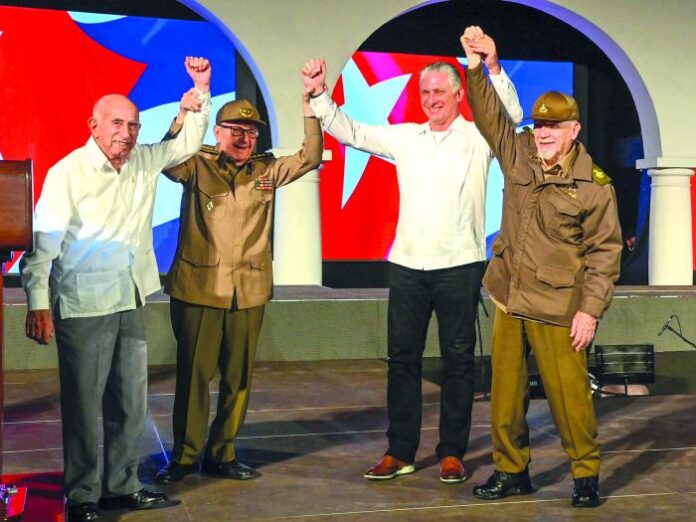He sees his Communist Party government enjoying great popularity

Diaz-Canel elogia la reforma agraria, la educación y la sanidad pública, “obras de profundo y sostenido calado social”
By 14ymedio/EFE
HAVANA TIMES – Former President Raul Castro reappeared this Monday to lead the celebrations of the 65th anniversary of the Revolution in Santiago de Cuba, in one of his most important public speeches in months. He called for unity within the Communist Party and confidence in the new generation of leaders who have succeeded the historical leaders.
Raul Castro, 92, closed the annual ceremony commemorating the triumph of the guerrillas who came to power in 1959 on the Island led by the late Fidel Castro (1926-2016), who was also presented, through technology, at the event. “No thieves, no traitors, no interventionists. This time it is the Revolution,” the deceased Commander was heard saying through a hologram.
His younger brother and successor in office made a speech in which he reiterated the need to close ranks within the ruling party as the “main strategic weapon” of the Revolution and the Communist Party. “It has allowed this small island to succeed in facing challenges. Let’s treat unity as something to be cherished,” he advised.
An estimated 7 to 10 percent of Cuba’s adult population are members of the Communist Party.

Against that unity, “all the subversive plans of the enemy will fail once again,” he added.
“Today I can affirm with satisfaction that the Cuban Revolution, after 65 years of existence, far from weakening has strengthened, as I said a decade ago, on a day like today and in this very place, [and has done so] without commitment to anyone at all, except to the people,” the former president claimed.
“I know that I express the feeling of the historical generation by ratifying confidence in those who today occupy leadership responsibility in our party and Government,” he said, in clear allusion to the current administration, led by his successor and current president of the country, Miguel Díaz-Canel, who is also the first president on the Island who was not part of the armed struggle in 1959.
Castro also emphasized that “there are no generational contradictions within the Revolution, because there is no envy or desire for power among its children,” a quote he attributed to Fidel Castro.
He also asked leaders who “because of insufficient capacity, lack of preparation or simply because they are too tired to be at the height that the moment demands,” to step aside.
Díaz-Canel spoke before Castro and was full of praise for the Revolution: “It was a libertarian act of continental projection, which not only freed the country from a servile, repressive and corrupt dictatorship, but very soon untied the knots of economic dependence on Yankee transnationals and liquidated the cruelest expressions of human exploitation that had been naturalized in the bosom of Cuban society, such as child labor, prostitution and the semi-slavery of Haitian emigrants.”
The current president highlighted what, in his opinion, have been the great pillars of Cuba after 1959: agrarian reform, education and public health. “These were works of profound and sustained social escalation that in a few years transformed a poor and backward country into a world benchmark in education, health, sports and culture,” he said.
With that in mind, he emphasized “the makers” of the Revolution who “have brought it undefeated” and, therefore, “deserve the greatest recognition,” the main one being that the following generations will be “loyal to the history,” he added.
“This is the Revolution that after having lost 3,000 doctors due to a politically induced exodus in the 60s of the last century built one of the most formidable and prestigious health systems of our time and today has half a million workers at all levels who guarantee universal coverage and free assistance for all Cubans. At the same time, during these six decades, 600,000 Cuban health professionals have collaborated in 165 countries,” he said, with no mention of the health workers who are currently in exile due to low wages and poor working conditions in Cuba.
Cuba enters 2024 plunged into a serious economic crisis, after a fall in 2023 GDP of 1% to 2% and a fiscal deficit of 19%, in addition to a shortage of basic products such as food, medicines and fuel.
Translated by Regina Anavy for Translating Cuba
Read more from Cuba here on Havana Times




